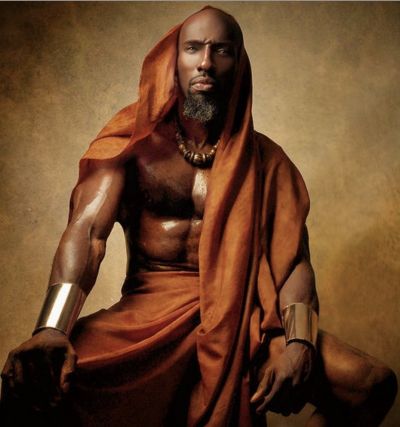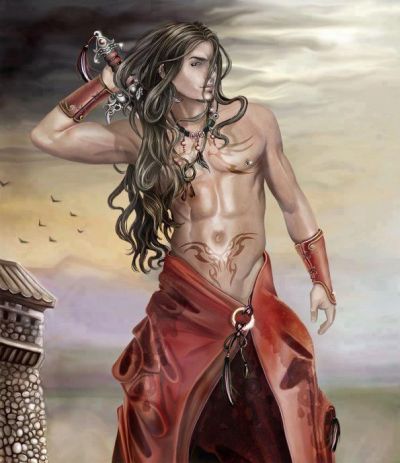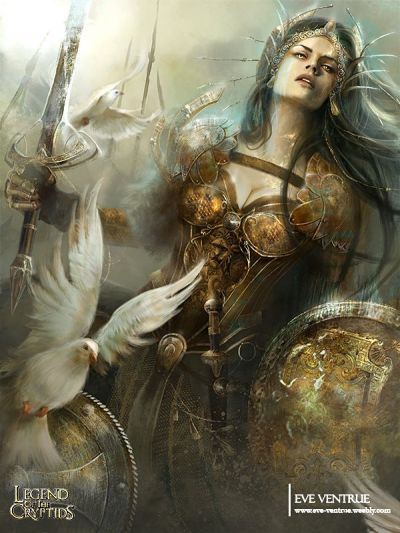Bem-vindo aos nossos novos jogadores brasileiros. Por favor leia
Difference between revisions of "Andus Religion"
From Sanctuary Shard
MamaWillow (talk | contribs) |
MamaWillow (talk | contribs) (→Cassia) |
||
| (18 intermediate revisions by the same user not shown) | |||
| Line 1: | Line 1: | ||
| − | ''It was only by a thin margin of theology that the Kingdom of Andus was able to maintain, for the most part, its own monotheistic worship during the [[Thorn King Era]]. '''Holy Acrab''', kept and held sway in Andus when all other kingdoms fell to the religion of the Andals. In the decades since the fall, two other gods have come into supremacy in this sun-soaked and jasmine-scented kingdom. '''Cassia''', the hero of Thule and <includeonly>[[Andus Religion|Read More ..]]</includeonly><noinclude>[[Category:Kingdoms]] | + | ''It was only by a thin margin of theology that the Kingdom of Andus was able to maintain, for the most part, its own monotheistic worship during the [[Thorn King Era]]. '''Holy Acrab''', kept and held sway in Andus when all other kingdoms fell to the religion of the Andals. In the decades since the fall, two other gods have come into supremacy in this sun-soaked and jasmine-scented kingdom. '''Cassia''', the war hero of Thule and '''Hekanani''', the ancient god-goddess of magic, prophecy and medicine.<includeonly>[[Andus Religion|Read More ..]]</includeonly><noinclude>[[Category:Kingdoms]] |
| − | + | =The Sun, the Moon, the Starlit Sky= | |
| + | <i>You are my sun, my moon, my starlit sky, without you, I dwell in darkness.<br> | ||
| + | Your power has enchanted me, I stand helpless against it. </i> | ||
| + | |||
| + | So begins the daily prayer to the Light of the Three, a blended Andusians religion that honors Acrab as for the traditions that are theirs alone, Hekanani as the androgynous god-goddess of ancient lore lost and refound, and Cassia the youthful warrior of change and fertility. | ||
| + | |||
| + | ==Acrab== | ||
| + | [[image: acrab.jpg|400px|right]] | ||
| + | The scorpion-sun king's form is unknown. This god is rarely if every seen, and he speaks through his prophets. Unlike the other races who typically honor the supposed form of their good, the desert people view scorpions with fear, believing it is a warning from the god that they are not pious enough. Icons of scorpions are typically found at the door way of homes, to say that the inhabitants know what it expected of them. | ||
| + | |||
| + | Acrab is a generous if not warm deity. His blessings come in the form of prosperity, luck, riches and intellectual enlightenment. His expectations are steep and while rarely seen, the weight of his displeasure will come if justified. Stories tell of a family who had broken hospitality and slew their guests, and were found later their bodies stung to death by deadly temple scorpions, only the children were spared. | ||
| + | |||
| + | ===Dahwa === | ||
| + | '''The Commandments Of ACRAB<i> | ||
| + | |||
| + | I am thy father, thy master, thy judge. Seek not others before me, for their laws do not govern thee. And thus I command thee. | ||
| − | + | Walk a path of righteousness. Honor my laws. Honor thy father and mother. Honor the blood of my land. Honor the five treasures that I have given thee. Seek glory in my name. Glory is the sublime balance between justice and mercy. | |
| − | + | ||
| − | + | Be always the right minded man, forsake lust, ill-will, cruelty and pride. Suffer not the ignorant, the wicked or those who put themselves above the position I have granted. Understand my truths. The circle of suffering does not end with this life, and each has the right to walk another turn of the wheel, and thus gain release. | |
| + | |||
| + | Judge not lest ye be judged yourself. Judgment is reserved for those most high in my eyes. Forget not that those highest in my eyes are most watched. Make right speech. Let thy speech be both honest and harmonious. Let not thy words place another in a position lower then thee, speak in full dominion when truth becomes a worthy act. | ||
| + | |||
| + | Make right action. Take not that which is not thine by right, by need or by spoil. Make not right as an excuse for greed. Speak not of need that which does not nourish your body or the lives of your children. Wage not war for spoil, gain or dominance. Remember in all things that I have granted thee free will, let mine gift not destroy thee.</i> | ||
| + | == Hekanani == | ||
| + | [[image: Hekanani.jpg|400px|right]] | ||
| + | Where Acrab says, "Glory is the sublime balance between justice and mercy", Hekanani say that ma'at (harmony and balance) is the central value of all life. Hekanani is depicted as an androgynous man carrying a staff and long blade. All physicians are believed to act on behalf of Hekanani power and will. Magic in an integral part of medical practice in Andus, and Hekanani worship was never fully displaced because of it. He was said to have killed two serpents and entwined them on a staff as a symbol of his power. | ||
| + | Hekanani is a god-goddess of magic, mystery, prophecy, and the endless possibility of life in all its starry fields. | ||
| − | + | <i> | |
| − | + | Lord of the gentle night, of star-filled darkness,<br> | |
| − | + | Guiding light and faithful companion,<br> | |
| + | Turn not Your face away from me. | ||
| + | Secret was Your birth,<br> | ||
| + | Silent are Your feet upon the sands,<br> | ||
| + | For no one knows the hour of Your coming.<br> | ||
| + | The perfume of Your arrival is as a cool breeze from Punt,<br> | ||
| + | The welcome of your voice, sweet music<br> | ||
| + | From a golden lyre.<br> | ||
| + | You stand between the worlds in the mists of Time,<br> | ||
| + | Before the twin pillars of Life and Death.<br> | ||
| + | Turn not Your face away from me. | ||
| + | Lord of the Crossroads, I hail You.<br> | ||
| + | Guide me in life as in death,<br> | ||
| + | May I walk in truth and balance,<br> | ||
| + | That my heart may be pure and light upon the scale.<br> | ||
| + | Turn not Your face away from me,<br> | ||
| + | Hekanani, beloved Friend. </i> | ||
| − | + | ==Cassia== | |
| + | [[image: Cassia .jpg|400px|right]] | ||
| + | Cassia, an [[Euresu]] of Thule is said to have to lead her people from Thule to Andus and begin the revolt against the [[Thorn King Era|Thorn King]]. She was a woman of surpassing beauty with golden skin and dark hair shot through with strands of silver. She was a warrior and hunter of unsurpassed skill a leader of her people before she reached the age of twenty-two. | ||
| − | + | Though her personal legend is less than a century old she is believed to be the reincarnation of other ancient Titan-goddess, Artemis or perhaps Athena, of whom the young woman was often compared to. She caught the attention of those non-humans who have legends of such a huntress, and the now free generation who are drawn to her beauty and boldness. | |
| − | + | <i> | |
| + | Lovely Goddess of War!<br> | ||
| + | Great Goddess of the Hunt!<br> | ||
| + | She of hound and horn.<br> | ||
| + | Thou who wakest in starry heaven<br> | ||
| + | When the sun is sunk in slumber<br> | ||
| + | Thou with moon upon thy forehead,<br> | ||
| + | Who the chase by night preferrest<br> | ||
| + | Unto hunting in the daylight,<br> | ||
| + | With thy nymphs unto the music<br> | ||
| + | Of the hooves--thyself the huntress,<br> | ||
| + | And most powerful: I pray thee<br> | ||
| + | Think, although but for an instant,<br> | ||
| + | Upon us who pray unto thee!<br> | ||
Latest revision as of 01:14, 4 October 2020
It was only by a thin margin of theology that the Kingdom of Andus was able to maintain, for the most part, its own monotheistic worship during the Thorn King Era. Holy Acrab, kept and held sway in Andus when all other kingdoms fell to the religion of the Andals. In the decades since the fall, two other gods have come into supremacy in this sun-soaked and jasmine-scented kingdom. Cassia, the war hero of Thule and Hekanani, the ancient god-goddess of magic, prophecy and medicine.
The Sun, the Moon, the Starlit Sky
You are my sun, my moon, my starlit sky, without you, I dwell in darkness.
Your power has enchanted me, I stand helpless against it.
So begins the daily prayer to the Light of the Three, a blended Andusians religion that honors Acrab as for the traditions that are theirs alone, Hekanani as the androgynous god-goddess of ancient lore lost and refound, and Cassia the youthful warrior of change and fertility.
Acrab
The scorpion-sun king's form is unknown. This god is rarely if every seen, and he speaks through his prophets. Unlike the other races who typically honor the supposed form of their good, the desert people view scorpions with fear, believing it is a warning from the god that they are not pious enough. Icons of scorpions are typically found at the door way of homes, to say that the inhabitants know what it expected of them.
Acrab is a generous if not warm deity. His blessings come in the form of prosperity, luck, riches and intellectual enlightenment. His expectations are steep and while rarely seen, the weight of his displeasure will come if justified. Stories tell of a family who had broken hospitality and slew their guests, and were found later their bodies stung to death by deadly temple scorpions, only the children were spared.
Dahwa
The Commandments Of ACRAB
I am thy father, thy master, thy judge. Seek not others before me, for their laws do not govern thee. And thus I command thee.
Walk a path of righteousness. Honor my laws. Honor thy father and mother. Honor the blood of my land. Honor the five treasures that I have given thee. Seek glory in my name. Glory is the sublime balance between justice and mercy.
Be always the right minded man, forsake lust, ill-will, cruelty and pride. Suffer not the ignorant, the wicked or those who put themselves above the position I have granted. Understand my truths. The circle of suffering does not end with this life, and each has the right to walk another turn of the wheel, and thus gain release.
Judge not lest ye be judged yourself. Judgment is reserved for those most high in my eyes. Forget not that those highest in my eyes are most watched. Make right speech. Let thy speech be both honest and harmonious. Let not thy words place another in a position lower then thee, speak in full dominion when truth becomes a worthy act.
Make right action. Take not that which is not thine by right, by need or by spoil. Make not right as an excuse for greed. Speak not of need that which does not nourish your body or the lives of your children. Wage not war for spoil, gain or dominance. Remember in all things that I have granted thee free will, let mine gift not destroy thee.
Hekanani
Where Acrab says, "Glory is the sublime balance between justice and mercy", Hekanani say that ma'at (harmony and balance) is the central value of all life. Hekanani is depicted as an androgynous man carrying a staff and long blade. All physicians are believed to act on behalf of Hekanani power and will. Magic in an integral part of medical practice in Andus, and Hekanani worship was never fully displaced because of it. He was said to have killed two serpents and entwined them on a staff as a symbol of his power.
Hekanani is a god-goddess of magic, mystery, prophecy, and the endless possibility of life in all its starry fields.
Lord of the gentle night, of star-filled darkness,
Guiding light and faithful companion,
Turn not Your face away from me.
Secret was Your birth,
Silent are Your feet upon the sands,
For no one knows the hour of Your coming.
The perfume of Your arrival is as a cool breeze from Punt,
The welcome of your voice, sweet music
From a golden lyre.
You stand between the worlds in the mists of Time,
Before the twin pillars of Life and Death.
Turn not Your face away from me.
Lord of the Crossroads, I hail You.
Guide me in life as in death,
May I walk in truth and balance,
That my heart may be pure and light upon the scale.
Turn not Your face away from me,
Hekanani, beloved Friend.
Cassia
Cassia, an Euresu of Thule is said to have to lead her people from Thule to Andus and begin the revolt against the Thorn King. She was a woman of surpassing beauty with golden skin and dark hair shot through with strands of silver. She was a warrior and hunter of unsurpassed skill a leader of her people before she reached the age of twenty-two.
Though her personal legend is less than a century old she is believed to be the reincarnation of other ancient Titan-goddess, Artemis or perhaps Athena, of whom the young woman was often compared to. She caught the attention of those non-humans who have legends of such a huntress, and the now free generation who are drawn to her beauty and boldness.
Lovely Goddess of War!
Great Goddess of the Hunt!
She of hound and horn.
Thou who wakest in starry heaven
When the sun is sunk in slumber
Thou with moon upon thy forehead,
Who the chase by night preferrest
Unto hunting in the daylight,
With thy nymphs unto the music
Of the hooves--thyself the huntress,
And most powerful: I pray thee
Think, although but for an instant,
Upon us who pray unto thee!


